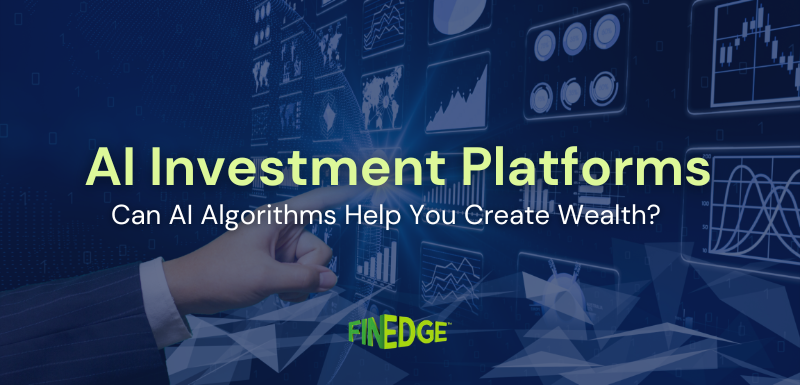AI Investment Platforms – Helpful, But Not the Whole Story
- AI-driven investment platforms are growing in India and globally, offering fast, data-driven insights.
- Algorithms can project scenarios like changes in interest rates, inflation, or skipped SIPs.
- But AI cannot manage emotions or personalize investments to your unique life goals.
- The best approach is balancing technology with human guidance for long-term success.
AI-driven platforms are changing how we invest, offering speed and scenario analysis at scale. But while algorithms can project outcomes, they cannot replace the human touch needed for personalization and emotional discipline. The smartest strategy is to let AI enhance, not dictate, your investing journey.
Artificial intelligence is making inroads into nearly every industry, and investing is no exception. An AI investment platform promises to analyze enormous amounts of financial data, spot patterns invisible to the human eye, and recommend strategies in real time. For investors in India, the appeal is obvious: efficiency, convenience, and data-driven decisions.
But does AI investing work in real life? The short answer is yes, but only up to a point. While AI can crunch numbers at lightning speed, it cannot manage human emotions or provide the kind of personalization that most investors actually need.
What is AI in Investing?
At its core, AI in investing refers to the use of machine learning and algorithms to process vast amounts of data. An AI investing app can scan financial statements, macroeconomic trends, and even news sentiment to recommend opportunities.
Globally, this space is expanding rapidly. The AI market size, valued at around USD 27 billion in 2019, is projected to grow nearly tenfold by 2027 (Fortune Business Insights). In India, too, AI-led investing platforms are increasingly visible, offering artificial intelligence investment advice at the click of a button.
According to the CFA Institute, common applications include spotting patterns in market behavior, portfolio optimization, and risk management. The Deloitte Global report also highlights how firms use AI to improve efficiency, distribution, and compliance.
These platforms can certainly enhance decision-making. But the question remains: how reliable are they if used alone?
Does AI Investing Work?
This is one of the most common questions investors ask. Does AI investing work? The answer is nuanced.
AI excels at scenario analysis. For example, it can simulate what happens if:
-
Inflation rises by 2% next year.
-
You delay or skip a monthly SIP contribution.
-
Interest rates climb or fall unexpectedly.
-
You shorten or extend your investment horizon.
By running these “what-if” situations, an AI investment platform can project likely outcomes. This helps investors visualize the impact of their decisions before making them. Similarly, AI can provide AI stock recommendations based on historical performance or correlation analysis.
However, while AI is great at showing potential outcomes, it cannot decide whether those outcomes fit your personal circumstances. A skipped SIP might look fine in a model, but what if it derails your retirement timeline or your child’s education plan? That’s where judgment and personalization come in.
Why Sole Reliance on AI Investment Platforms is Risky
AI tools are powerful, but they are not infallible. Over-reliance can be risky for several reasons:
-
Emotions drive investing decisions. No algorithm can calm an anxious investor during a market crash. AI might recommend holding on, but fear can push you to exit prematurely, often at the wrong time.
-
No personalization. AI can suggest “top-performing” funds or stocks, but it does not know that you want to retire at 55 or save for your child’s overseas education.
-
Safety concerns. Many ask, is AI investing safe? The safety depends entirely on using regulated, trustworthy platforms. Fraudulent or unverified apps can misuse your data or lead to poor advice.
So while AI may provide insights, investors should not outsource their entire financial future to it.
The Human Element of Investing– Personalization & Emotions
The real gap lies in two areas AI cannot bridge: personalization and emotions.
Consider this: during the COVID-19 crash, many investors panicked and withdrew funds, locking in losses. AI models would have advised staying put, but only a human guide could reassure and keep investors disciplined.
Similarly, life changes, a salary increase, new family responsibilities, or unexpected expenses, impact investment priorities. An AI investment advisor cannot adapt to these nuances. It cannot tell you whether to prioritize your child’s college fund over buying a second property.
This is why many investors conclude that AI investing is any good only when combined with human judgment.
Best of Both Worlds – Human + Technology
The future of investing lies not in choosing between humans and AI but in combining them.
-
Technology brings speed, scalability, and data-driven projections.
-
Human expertise adds empathy, personalization, and the behavioral guidance needed to stay invested through ups and downs.
Together, this creates a bionic model of investing, where machines enhance, but humans guide. For most investors, this blend offers the best chance of building long-term wealth without falling prey to short-term emotions.
Safe Use of AI Investment Platforms
For those exploring AI-driven tools, a few safeguards are essential:
-
Use only registered AI investing apps in India, preferably those regulated by SEBI.
-
Avoid platforms that promise guaranteed returns, a red flag for mis-selling.
-
Treat AI outputs as inputs, not instructions.
-
Always cross-check advice with trusted experts.
Some investors also ask: is robo investing AI? The answer is partly yes. Robo-advisors use algorithms to create model portfolios, but they often operate with minimal or no human oversight. That makes it even more important to exercise caution.
Wrap-Up
AI is reshaping investing, and its potential is enormous. From AI investment platforms that simulate scenarios to apps that offer instant insights, the tools available today are far more advanced than a decade ago.
But the fundamentals of investing remain unchanged: discipline, personalization, and long-term focus. Algorithms can enhance decisions, but they cannot replace human wisdom.
So, does AI investing work? Yes, but only as a complement, not as a substitute. The smartest path is to let AI handle the data, while humans handle the emotions.
FAQs
Your Investing Experts
Continue Reading
How FinEdge is leveraging Tech during the COVID-19 pandemic
We are currently in the midst of unprecedented times. As the COVID-19 pandemic brings the world to a literal standstill, Financial Advisors are scrambling to find their feet and continue serving their customers. To add fuel to the fire, equity markets witnessed a selloff of unrivalled proportions as fear and panic took over right after the lockdown began. During the past month of the crisis, FinEdge has proudly continued to deliver high quality Financial Advice to customers, while ensuring the complete safety of its employees. Here are some ways in which leveraging on technology has helped us in our endeavours.
FinEdge App: Invest With Clarity, Stay Disciplined, Achieve Your Goals
The FinEdge app is designed to make your investing journey more organised and guided. It helps you and your investment manager plan your goals with clarity and review them whenever life changes.
AI Investment Platforms – Helpful, But Not the Whole Story
AI-driven platforms are changing how we invest, offering speed and scenario analysis at scale. But while algorithms can project outcomes, they cannot replace the human touch needed for personalization and emotional discipline. The smartest strategy is to let AI enhance, not dictate, your investing journey.




